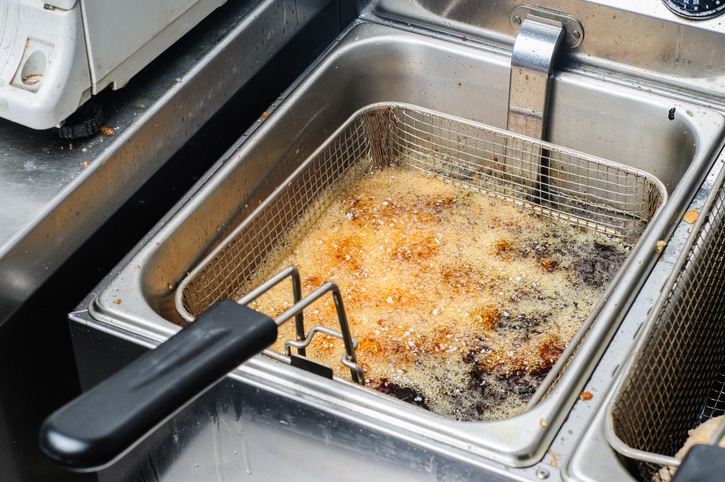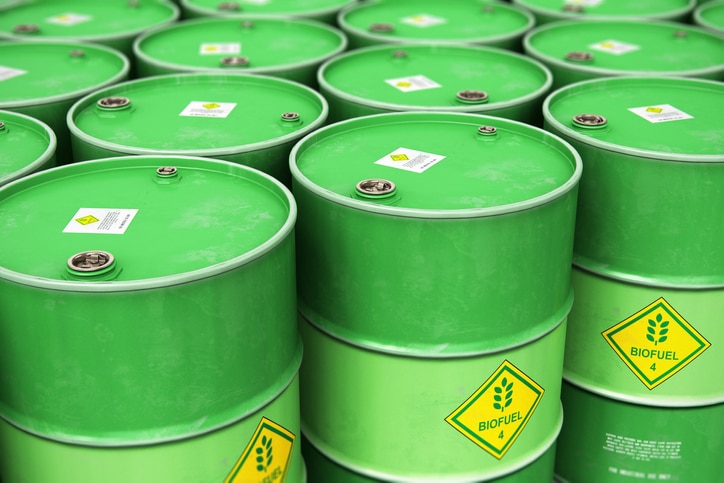Unfortunately, many people do activities that negatively impact the environment. In many situations, they do not know they’re hurting the earth already. Some of these activities are common habits such as:
- Wasting of paper
- Using plastic bags
- Leaving the lights on
- Not turning off the tap
While this list is not exhaustive, another activity that often goes under the radar is the disposal of used vegetable cooking oil. Many food manufacturers and restaurants dispose of their oil in a way that is not sustainable.
Here at GF Commodities, we encourage proper vegetable oil recycling because even a small quantity of oil, if improperly disposed of, can cause harm to the environment. In fact, the Environmental Protection Agency (EPA) regulates vegetable oils (and other types of cooking oil) under 40 CFR 112, which also standardizes petroleum oils. The EPA states that cooking oil could also impact the environment similarly to fossil fuels. It can:
- Produce rancid odors
- Cause devastating physical effects, such as coating plants and animals with oil
- Destroy existing and future food supplies
- Contaminate shorelines and clog water treatment plans
- Form products that linger in the environment
Environmental Risks of Improper Cooking Oil Disposal

FOG (fat, oil, and greases) is derived from vegetable, plant, or animal sources during cooking. It presents itself in two different ways:
- Brown grease containing FOG floats or settles into solids
- Yellow grease from deep frying
Improper disposal of both types of cooking oil poses harm to the environment. When you pour used oil down a drain, the oil hardens and infiltrates into local water, sewer, and waste management facilities, which do not have the equipment to process FOG.
When the oils and fats from your vegetable cooking oil end up in the sewers, they break down into smaller components of fatty acids and glycerol, which bind with calcium, creating a soap-like compound that dwells in the sewer system.
Untreated sewage particles combined with waste oil in the water causes a drastic drop in oxygen levels, which results in the development of sewage fungus. The fungus blankets the bed of the body of water.
If the water is riddled with fungus, it can no longer support fish, insects, and other creatures that live in and around the water. The oil can also reach natural water reserves, which puts the lives of aquatic and marine creatures at risk. In case unused cooking oil reaches the water, it can kill aquatic life forms and birds by coating them with a thick layer of sludge. This reduces their ability to breathe, which can lead to them choking to death.
Apart from reducing oxygen levels, waste or used oil also block sunlight, which makes it difficult for plants to photosynthesize. It can also render the soil unproductive and contaminated since waste oil changes biological cycles in the soil.
Increased Risk of Fire
Improper disposal of unused vegetable oil can also lead to fires. Fires occur in kitchens and in food manufacturing plants due to grease traps filled with cooking oil. Since cooking oil has low flashpoints, it is highly flammable. An overflowing grease trap can spill oil near the stove or any gas source, which can cause a fire.
Even the smallest grease fires are difficult to contain. Failure to manage a small fire can blow up to a bigger and more disastrous fire.
Other environmental costs of the improper disposal of oil could include:
- Overflow of bacteria into water lines and area buildings
- Noxious and rancid fumes from FOG
- Paying the Price for Environmental Damage
Needless to say, businesses that do not practice the proper disposal of cooking oil face an array of consequences.
First, you compromise the quality of your food and service. Insects and other vermin are attracted to the fumes of FOG. Your kitchens are at risk for pests that could leave diseases on your food, which could put your customers at risk. Not to mention that the terrible smell lingering throughout your restaurant could discourage customers from eating.
Second, you could face hefty fines for noncompliance. You might also have to pay for costly repairs. Instead of saving up for more important business finances, you could end up paying for water damage and emergency flooding call-out charges, maintenance costs, and fines from the local water authority.
Finally, you risk your company’s reputation for not abiding by disposal regulations and adhering to environmental sustainability measures. Today’s consumers prefer supporting businesses that promote environmentally-friendly practices. If you’re not doing your part in saving Mother Nature by disposing of your cooking oil properly, customers will choose your competitors.
The simple act of pouring cooking oil down the drain might be an easier way of disposing of used oil, but it comes with huge costs. Instead of hurting the environment (and hurting your business as a result), turn to vegetable oil recycling.
How Does Vegetable Oil Recycling Work?
Used cooking oil can be refined into different types of biofuels for heating and power generation. With vegetable oil refining, the oil undergoes a process of transforming vegetable oil into fuel by hydrogenation or hydrocracking. Hydrogenation adds hydrogen to molecules while hydrocracking uses hydrogen to break down the oil’s larger molecules into smaller ones. These methods are used in the production of low-carbon diesel, gasoline, and propane.
If these seem like complex processes to you, fear not. Recycling companies can recycle your cooking oil for you.
Protecting the Environment and Using Renewable Energy

Used vegetable oil recycling is a great way to protect the environment from harm associated with improper oil disposal. Thanks to innovative measures, it’s possible to convert vegetable cooking oil into biodiesel, a clean fuel that is less harmful to the environment.
Using biodiesel promotes a decline of greenhouse gas emissions from cars and companies by 90 percent or more. According to the National Renewable Energy Laboratory (NREL), biofuels produce 78.5 percent fewer carbon dioxide emissions compared to regular diesel. It burns cleaner than fossil fuels and does not produce aromatics or sulfur, so there is none of the unpleasant smell associated with burning regular fuels.
Biodiesel is made by reacting vegetable oil with other common chemicals. Most companies use the following materials to make clean fuel:
- Used cooking oil
- Sodium hydroxide
- Methyl alcohol (methanol)
Contribute to a Cutting-edge Industry
Biodiesel hasn’t totally replaced fossil fuels and other traditional energy sources on a larger scale, but it is on its way. The industry continues to expand, bringing along exciting possibilities such as new companies and new jobs. Some of the industries that will benefit from vegetable oil recycling include engineering, information technology, accounting, marketing, sales, and training.
Less Clean-Up and Lower Repair Costs
The misconception with pouring oil down a drain is that the waste will directly go to a treatment plant that will clean the oil before the water returns to its original source. No harm done, they think.
On the contrary, clogged oil in drainage pipes poses a lot of harm to the public sewage system. Clogged pipes have negative economic effects for homes, businesses, and the entire community, forcing people to call experts for pipe repair. Such repair projects are expensive and are prone to recur if the homeowners or business owners continue to pour oil down the drain.
Clogged sewer systems can also spill contaminated water out onto the streets, which are difficult and costly to clean up. Also, it will cost local authorities a huge sum of money to fix clogged pipes within an extensive system. These situations also pose potential health hazards that can affect an entire community. In case of such circumstances, health expenditures will skyrocket, which will put the burden on both the local authority and the community.
Store Used Oil for Collection and Recycling
Proper vegetable oil recycling begins with the storing of used oil in the right container. The safest way to do so is by using the original containers that came with the vegetable oil or containers that are approved by government agencies. The storage container should be closed tightly to avoid leaks that can harm the environment.
When choosing the storage container, avoid those that contain paint, antifreeze or any sort of harmful chemicals. Also, ensure that you are being careful in transferring the oil into the container to avoid spillage. Once you’ve sealed the container, label it clearly.
Keep Used Cooking Oil in a Safe Place
Since you are unlikely to dispose of used oil the day you changed it, store it in a safe place where no one can get a hold of it (and improperly dispose of it). Do not keep used cooking oil in the same place with unused oil to avoid confusion.
Discarding cooking vegetable oil can be a greasy business, but that doesn’t mean you should throw it down the drain. For the sake of the environment (and your business, too), store used cooking oil properly and ensure an authorized collector takes it away.
This is where we come in.
What You Can Expect with GF Commodities
GF Commodities’ used oil collection service is easy to arrange and stress-free. As a nationwide buyer of used vegetable oils, we can sell your used oil to industries that will use them. Your used vegetable oil will be disposed of in an environmentally-friendly way that offers peace of mind.
When you choose us for your used cooking oil recycling requirements, you will receive 100 percent of the in-spec weight of your products. If a trailer is 98 percent or higher oil content, you won’t be getting just 98 percent; you’ll get a hundred percent of the trailer content. This ensures that you get the best value from our service.
Do your part for the environment and improve your business’ operations by recycling your used vegetable oil. If you want to learn more about our oil recycling service or wish to have us recycle your used oil, let us know.
Call us at 816-812-8685 or fill out our contact form!



